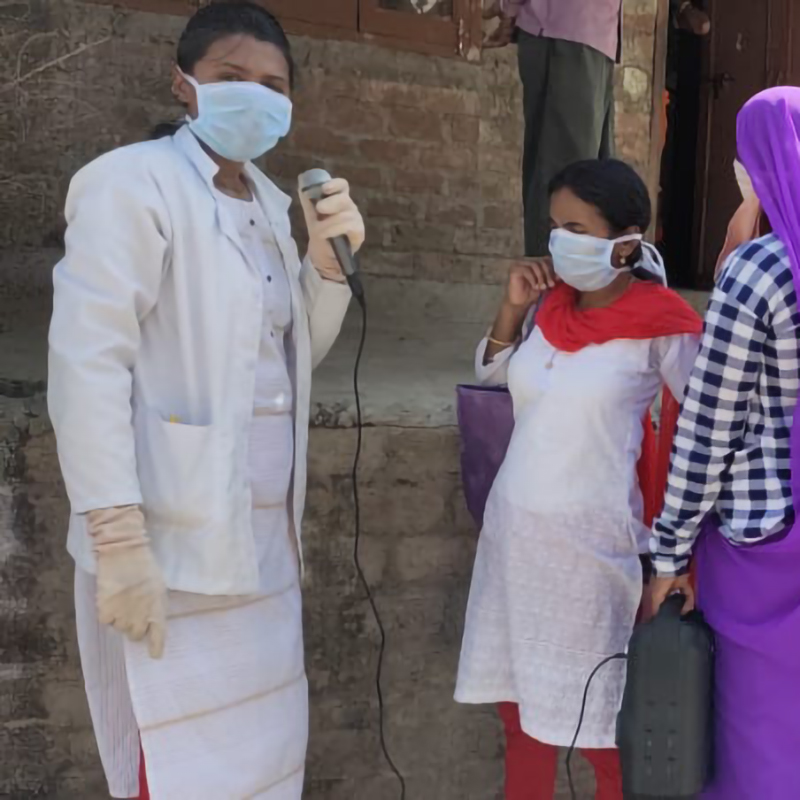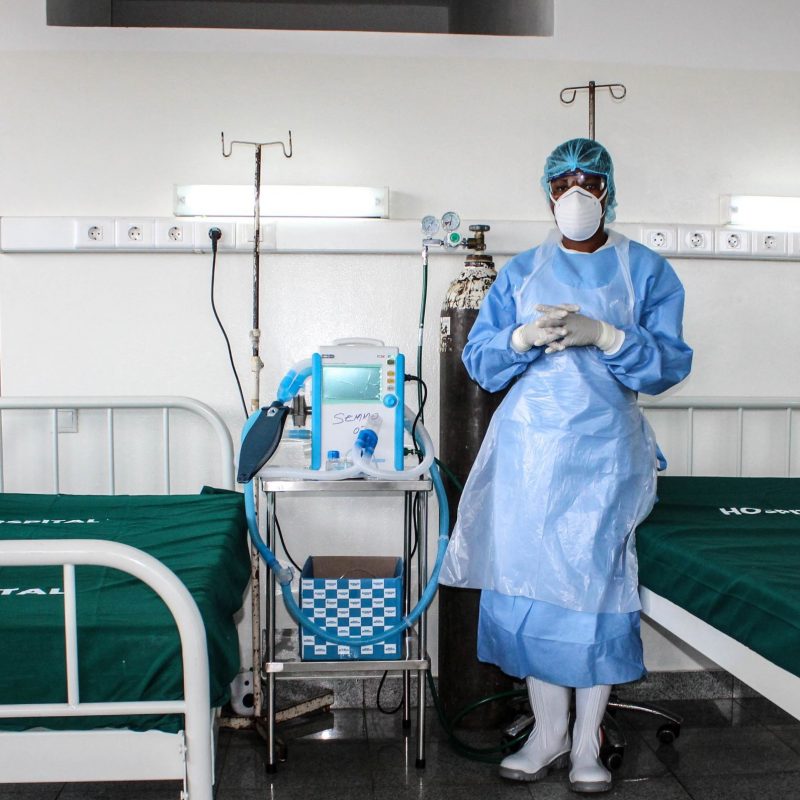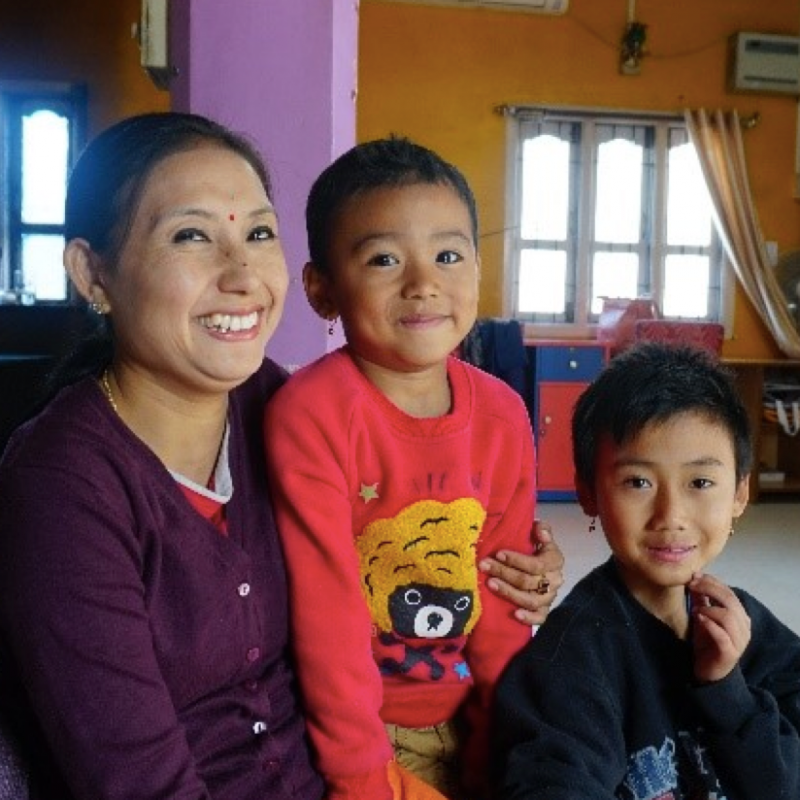Early lessons from the Baltimore Health Corps
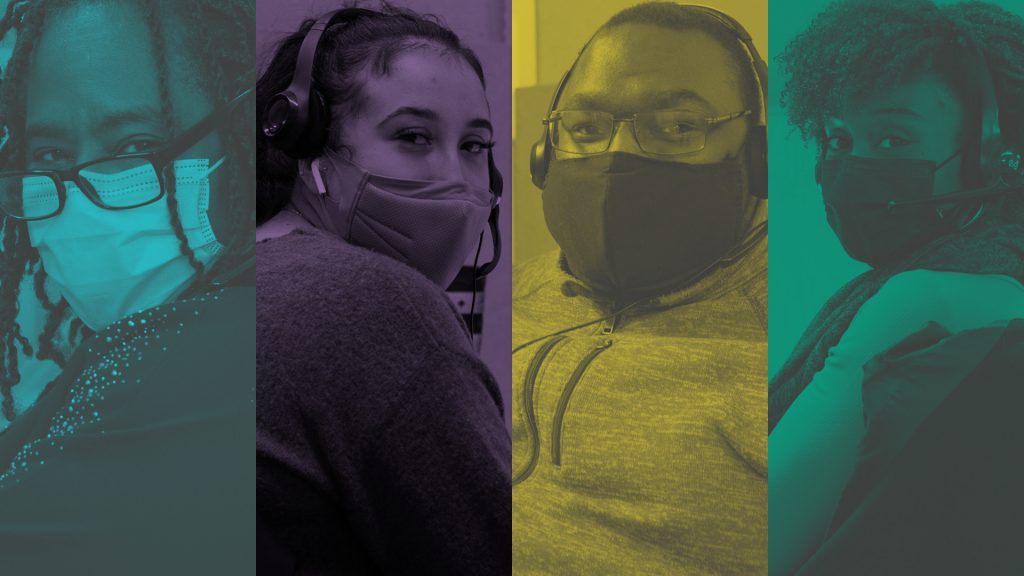
The Baltimore Health Corps, Jhpiego’s first ever US-based COVID-19 prevention project, has achieved its initial goal of establishing a network of contact tracers to identify coronavirus cases, help prevent the spread of the disease and link those affected to services, a new analysis shows. Jhpiego is a key member of the BHC public-private partnership that is led by the Baltimore City Health Department with support from The Rockefeller Foundation, the Johns Hopkins Bloomberg School of Public Health and other key stakeholders.
Read the Press Release“It is satisfying to see that the Baltimore Health Corps team reached our goal of hiring those displaced by the pandemic in a racially equitable way, while increasing the city’s capacity to respond to the health crisis. We need to continue to prioritize racial equity in our response to COVID-19, as well as demonstrate flexibility as the pandemic evolves.”
Otis Rolley III, The Rockefeller Foundation Senior Vice President, U.S. Equity and Opportunity Initiative.
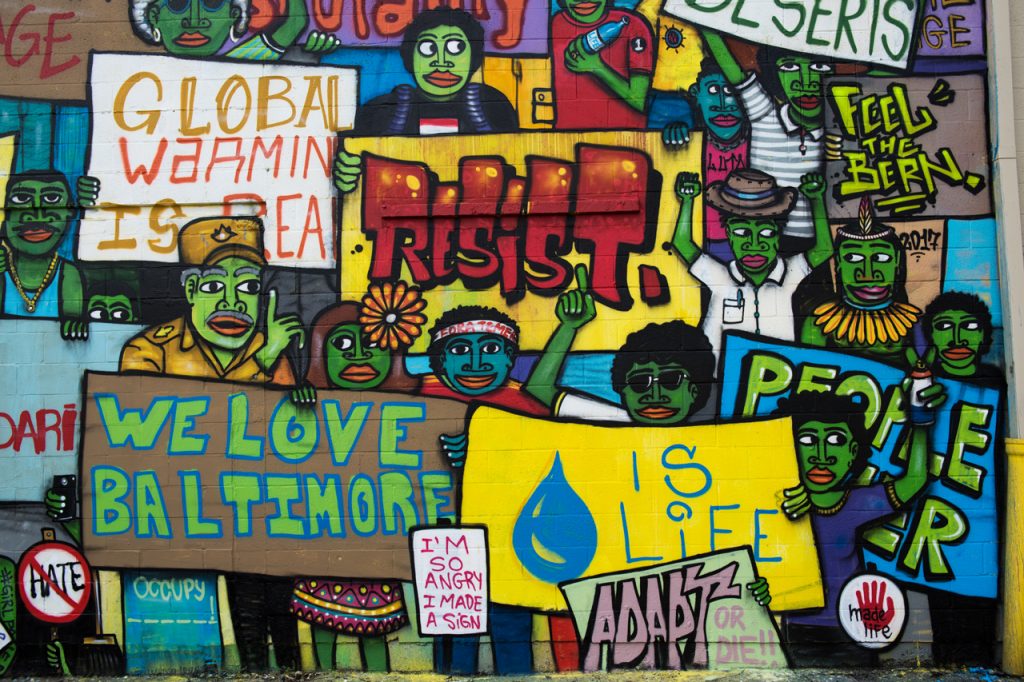
Meet four contact tracers working in the Baltimore Health Corps
For the first time in our 46-year history, Jhpiego is serving in our own hometown, working with and on behalf of Baltimoreans, sharing lessons learned around the globe about contact tracing. We’re pleased to introduce Cheryl, Denisha, Joshua and Olivia, four of the 150-plus contact tracers we helped to train using materials we co-developed.
Learn about Jhpiego trained COVID-19 contact tracersJHU Hosts a Real-Time Map of COVID-19’s Global Spread
For real-time, accurate information on global cases of COVID-19, including deaths and individuals recovered in affected countries, see the interactive map hosted by the Johns Hopkins University Center for Systems Science and Engineering.
Latest COVID Announcements
- On the forefront of vaccine rollout: May 12
- Self-Care Accelerates as Pandemic Persists: November 12
- Tune in 10/18 to hear Jhpiego’s CEO Leslie Mancuso on Women to Watch!: October 15
- Testimonials: October 8
- World Contraception Day: September 26
- Innovations: August 27
- COVID-19 vaccine innovators offer a healthier future for all: August 11
- Mask Up: July 30
- Responding to gender-based violence before,during and after the pandemic: July 2
- COVID-19 Operational Guidance for Health Programs: June 24
- Tracking a Deadly Virus: June 13
- Baltimore and Beyond,Fighting COVID-19 in Jhpiego’s Hometown: June 4
- Safeguarding Health in West Africa: May 30
- Digital delivers across the miles during lockdown: May 23
- Contagion Calls for Contraception Contingencies: May 12
- Childbirth, Midwives,COVID-19: May 7
- Maintaining critical HIV services during the pandemic: April 30
- We’re mobilizing to stop COVID-19 around the world!: April 14
- Invest in Nurses Now: April 7
- A Woman’s Right to Respectful Care During COVID-19: April 5
- Staying Ahead of the COVID-19 Curve: March 26
- COVID-19: Thank the True Heroes TODAY!: March 24
- COVID Update: March 16
Don’t miss these new COVID-19 resources.
Training Package for Supervisors and Managers of COVID-19 Case Investigation
Get the supervisor and manager package
Contact Tracing Programs and Training Package for Covid-19 Case Investigation and Contact Tracers
Operational Guidance for Continuity of Essential Services Impacted by COVID-19
A practical guide for program implementation and adaptation
In response to COVID-19, country leaders and health programs are working diligently to balance the need to provide attention and resources to the pandemic response with the need to maintain the delivery of other essential health services to preserve hard-earned gains in health outcomes.
To lessen the blow on fragile health systems, Jhpiego developed operational guidance that synthesizes global recommendations, current best evidence and critical resources to help health care providers, managers and leaders maintain essential health services during and after the pandemic, and ensure families receive the care and treatment they need and deserve.
Read the Operational GuidanceNurses on the frontlines
New personal protective equipment resource for health care workers
Based on World Health Organization guidelines, Jhpiego developed a handy infographic for health care workers, support staff and community health workers to help identify and utilize the right personal protective equipment.
See the infographicKey considerations for intrapartum care in the context of COVID-19
Jhpiego’s new, easy-to-use reference based on World Health Organization guidance walks health care workers through initial assessment of clients presenting for intrapartum care in the context of COVID-19—from normal rapid assessment for complications in pregnancy to assessment for signs and symptoms of COVID-19. Next steps for clients presenting with symptoms of COVID-19 are also provided, emphasizing infection prevention and control and provision of respectful, client-centered care.
See the guidance for intrapartum care during COVID-19Ensuring Quality Family Planning Services during the COVID-19 Pandemic
On April 17, 2020, Jhpiego released guidance for family planning programs worldwide. Family planning remains an essential right for women and families, and services should be treated as such, while health care providers, clients and communities work together to stay safe and healthy.
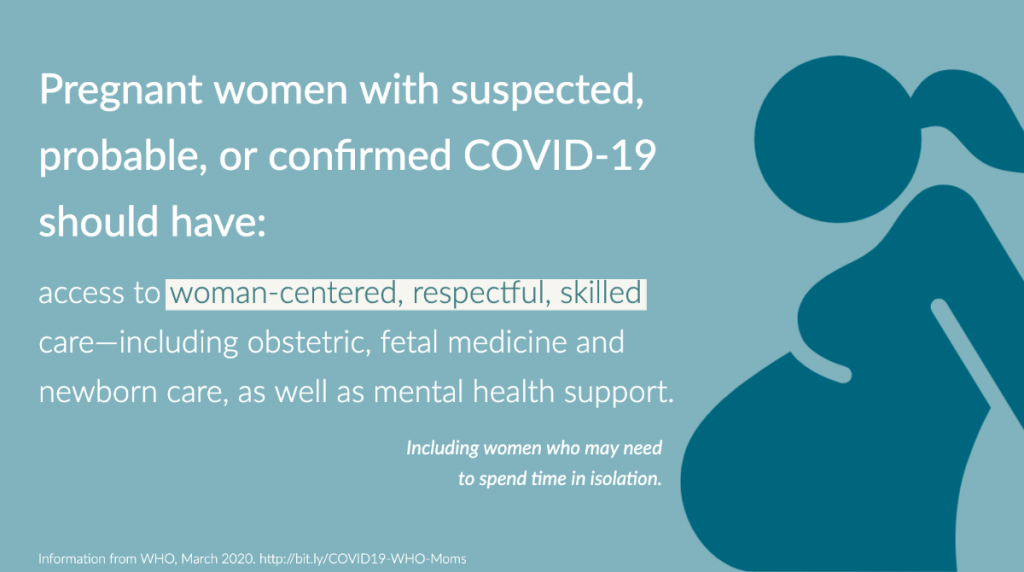
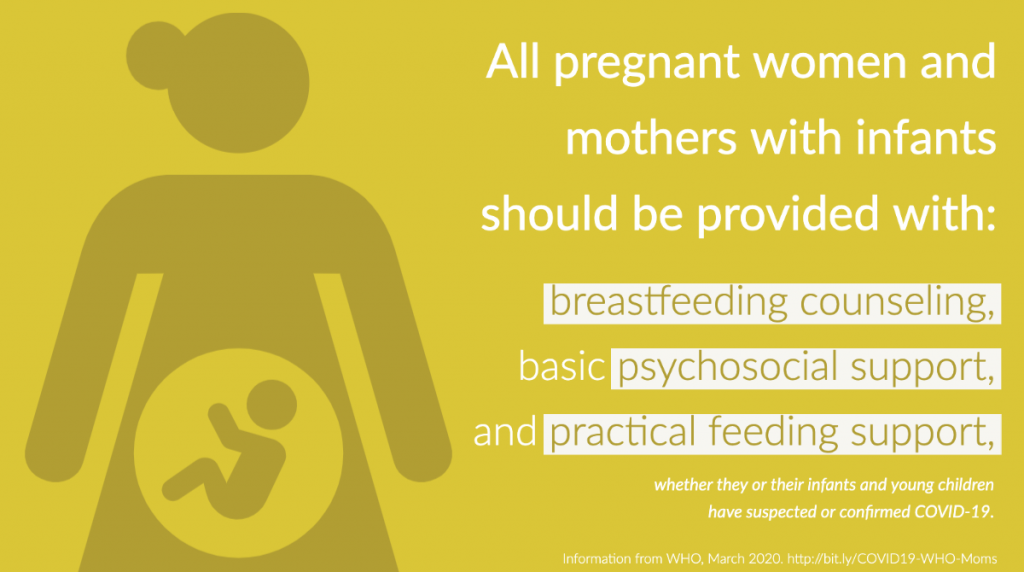
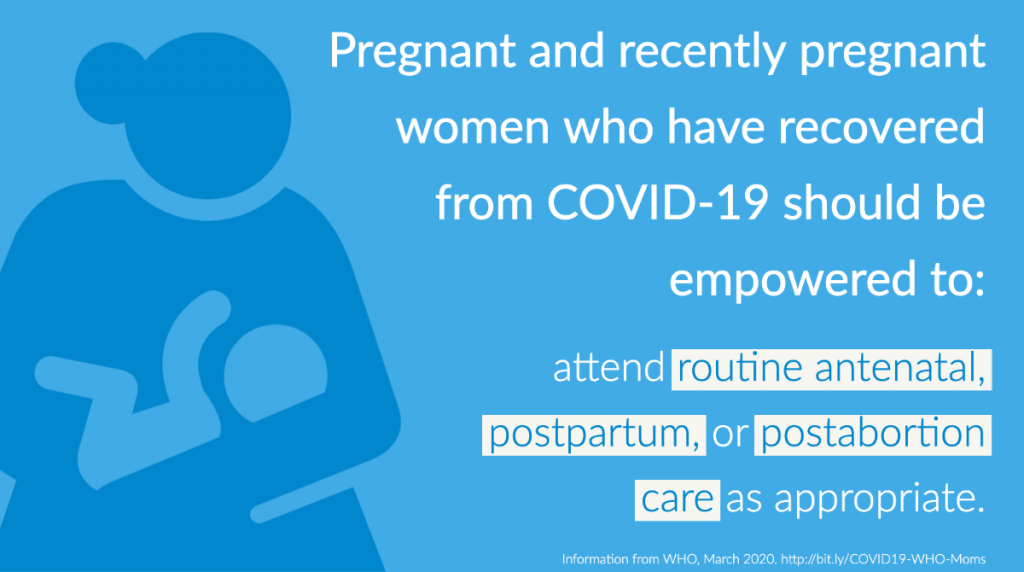
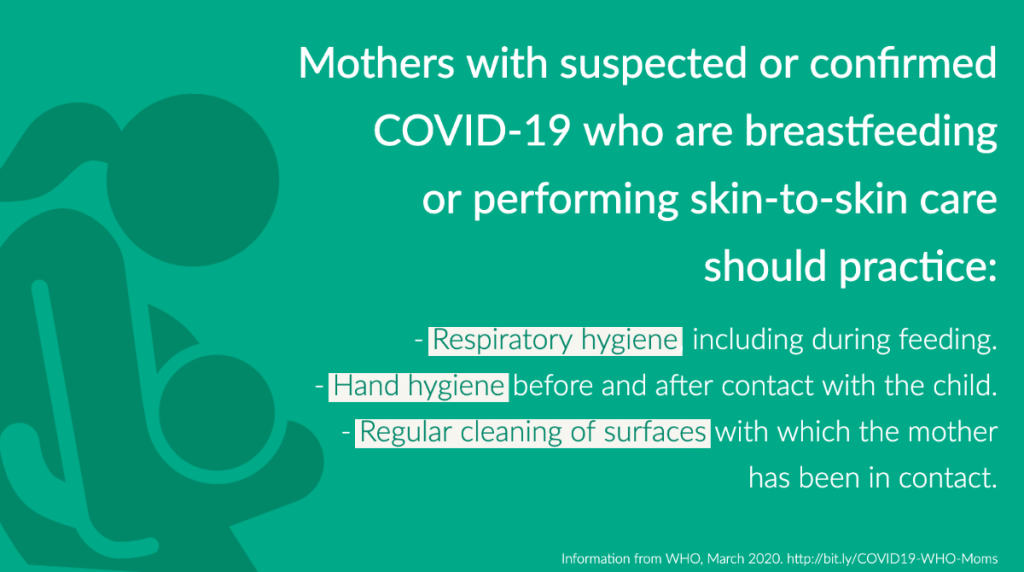
Ensuring High-Quality Maternal Care in the Face of the Pandemic
COVID-19 presents new challenges to pregnant and breastfeeding women and their health care providers. The guidance in these four graphics can help to ensure that all pregnant women, new mothers and infants receive respectful, client-centered care while taking precautions to avoid infection.
Click on each image above to see it full-sized.
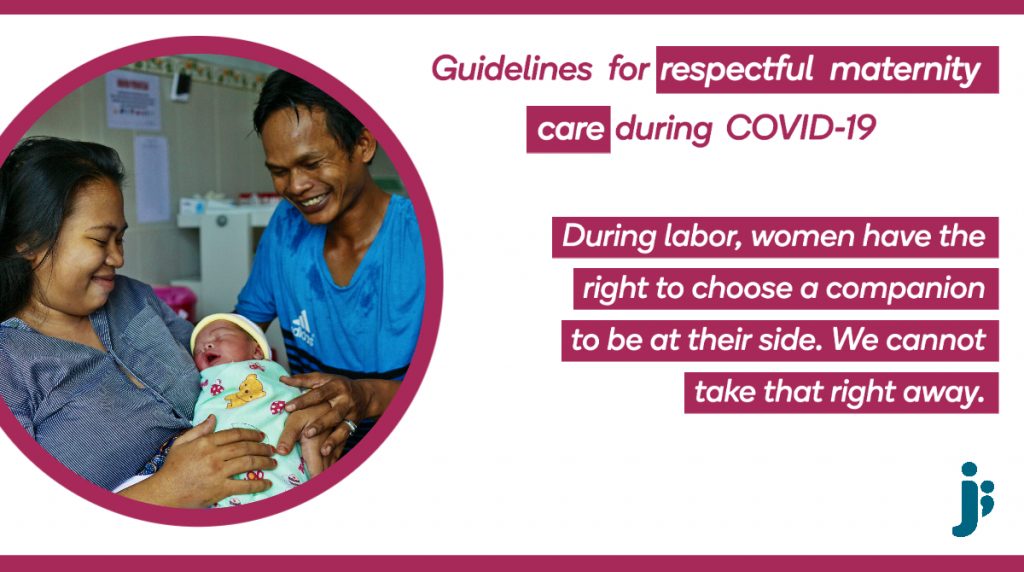
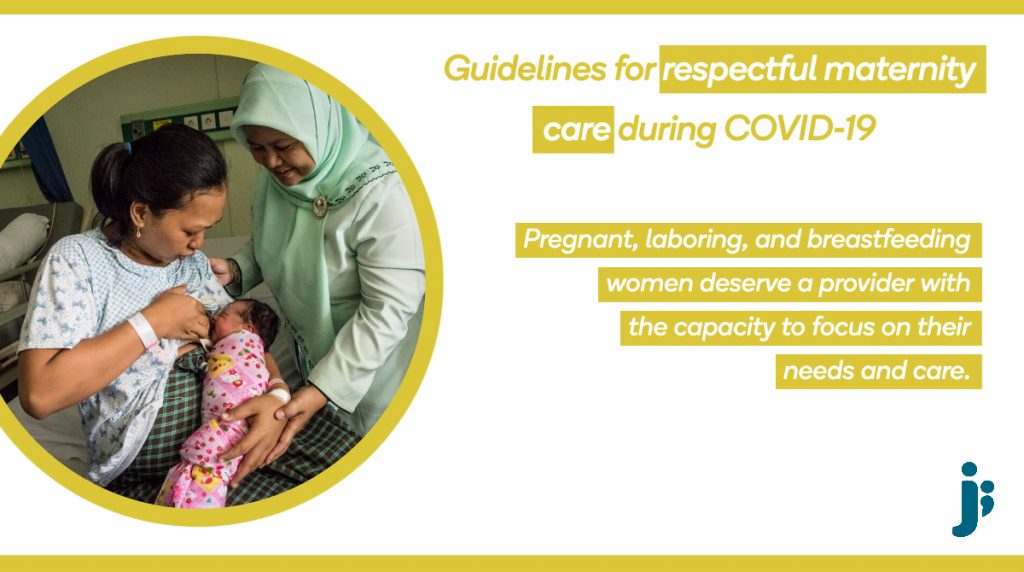
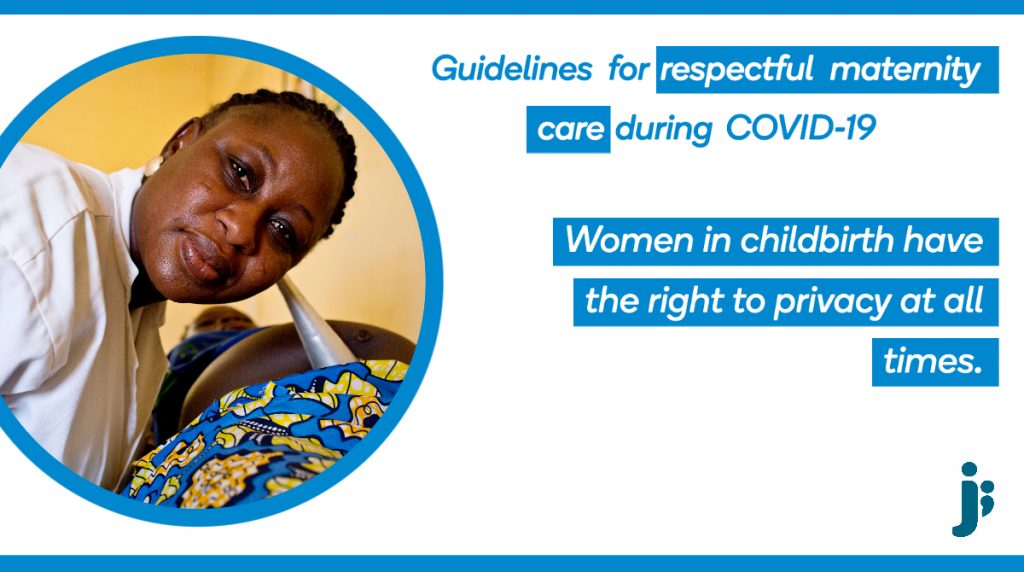
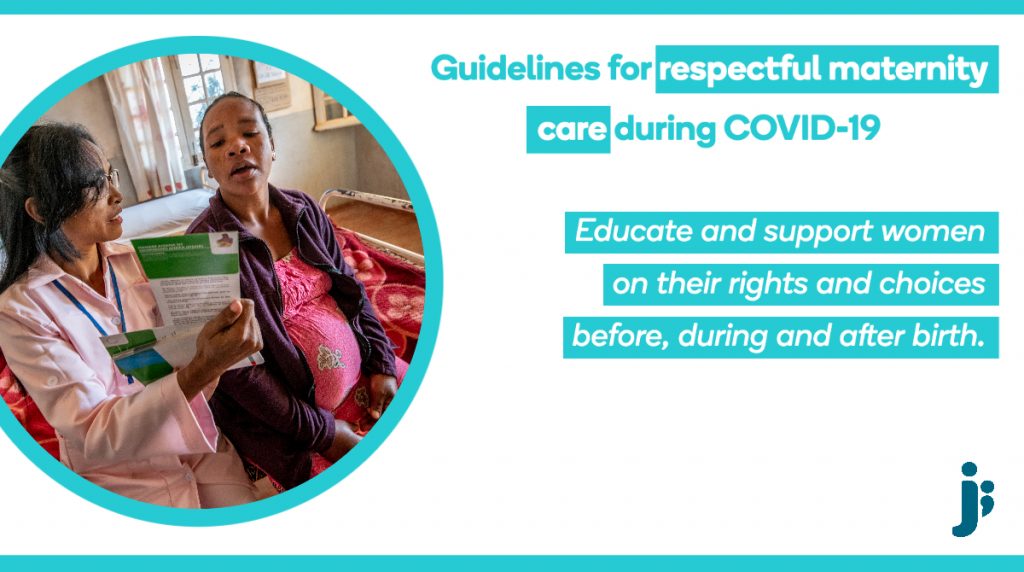
Respect women’s rights and ensure health worker safety.
Tweet this: We don’t have to choose one or the other! Laboring women deserve respect, privacy and dignity during childbirth—even with suspected #COVID19. Health workers deserve access to processes and PPE to stay safe. Both are possible. Innovative solutions + resolve are needed.
Keeping health workers safe and facilities prepared to provide lifesaving care
We work with ministries of health and professional associations to build countries’ ability to prevent health care-associated infections among patients and health workers.
Since 1996, Jhpiego has led, designed and implemented initiatives for infection prevention and control (IPC), disease surveillance, outbreak response (most recently for Ebola Virus Disease and strengthening of IPC-related areas of health systems. Taking appropriate steps helps keep health workers, patients and communities safe. Jhpiego partners with host government institutions and health care and allied sciences associations to integrate IPC practices into technical programs. To do so, we:
- Build capacity. Jhpiego strengthens human capacity for IPC by:
- Developing learning resource packages and national and international guidelines and standards
- Training health care providers and master trainers in IPC
- Building competencies in quality improvement
Jhpiego also has expertise in helping health systems to address the health workforce gaps and challenges created by outbreaks. During the 2014–2016 West Africa Ebola Virus Disease outbreak, we worked side by side with the governments of Liberia, Guinea and Nigeria to provide critical IPC training and assistance to ensure that health care workers were safe on the job and prepared to provide lifesaving care.
- Provide global leadership. We collaborated with Johns Hopkins Medicine, Johns Hopkins Hospital, Department of Hospital Epidemiology and Infection Control to update our Infection Prevention and Control: Reference Manual for Health Care Facilities with Limited Resources and produce Prevention and Control of Ebola Virus Disease in Health Care Facilities with Limited Resources.
We also worked with a team at Johns Hopkins University to develop an enhanced personal protective suit for health care providers working in Ebola centers.
Read our response to COVID-19Technical resources for IPC and outbreak response
Infection Prevention and Control: Reference Manual for Health Care Facilities with Limited Resources.
This manual is designed to provide IPC guidance to hospitals (e.g., tertiary care teaching, regional and district hospitals), clinics and other health care facilities (e.g., in the private sector), including in limited-resource settings. IPC interventions do not need to be elaborate or expensive to be effective. Preparation, knowledge, attention to detail and rigorous, systematic processes are critical elements of an IPC program and are far more important than expensive technologies or devices. Using the latest available evidence-based recommendations and guidelines, Jhpiego collaborated with colleagues from the Johns Hopkins Medicine Healthcare Epidemiology and Infection Prevention team to update and expand the 2003 Infection Prevention: Guidelines for Healthcare Facilities with Limited Resources.
Click through the modules below.
IPC modules for management of COVID-19 include:
- Module 1. Chapter 2: Standard and Transmission-Based Precautions
- Module 2. Hand Hygiene
- Module 3. Personal Protective Equipment
- Module 5. Facility Management:
- Chapter 2: Environmental Cleaning
- Chapter 4: Processing Reusable Health Care Textiles
- Waste management and disposal
- Module 11. Infection Prevention and Control Program Management
- Chapter 2: Principles of Public Health Emergency Preparedness and Outbreak Management for Health Care Facilities
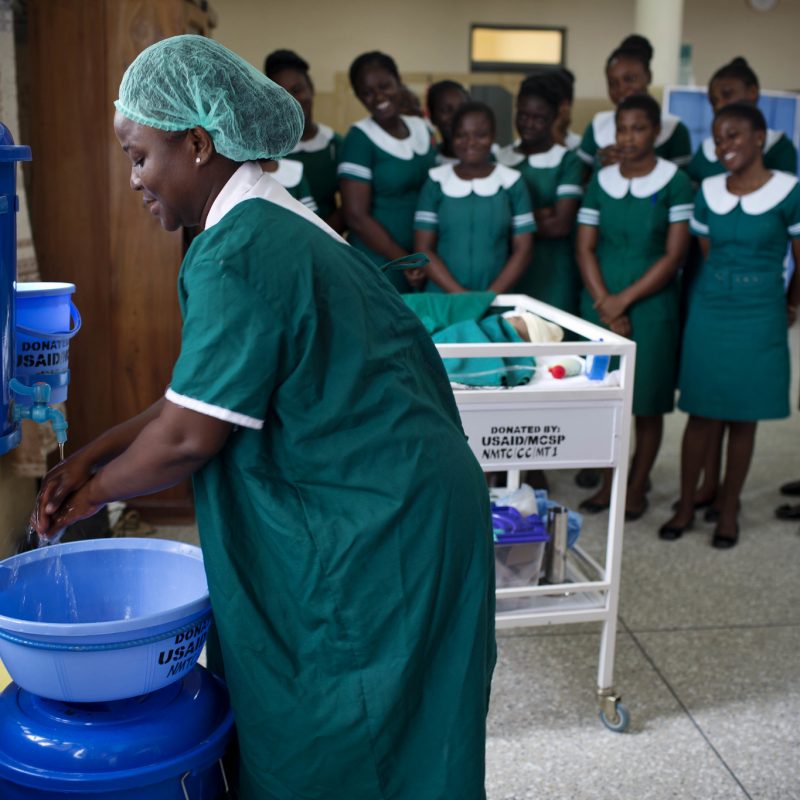
Clean your hands, save lives!
Whether you wash properly with soap and water, or use an alcohol-based handrub, clean hands can save lives. Watch this quick look at how health workers in India adhere to the World Health Organization’s guidelines for hand hygiene!
Ebola Crisis in West Africa, 2014–2016
Having decades of experience in the region, Jhpiego worked side by side with the governments of Liberia, Guinea and Nigeria to provide training and assistance to health workers during the 2014–2016 Ebola Virus Disease outbreak. We assisted ministries of health and professional organizations as they addressed the crisis that disrupted many essential health services. We reinforced health workers’ infection prevention skills so they could perform their jobs safely. This work saved lives and was a crucial step in building the confidence of women and their families in health facilities so they would return for services—of particular concern for pregnant women and new mothers.
- Jhpiego Is Helping Fight Ebola with Infection Prevention Training. November 2014.
- From Hackathon to Innovation: Making Ebola Fighters Safer. December 2014. Advanced protective gear for health workers who treat Ebola patients, devised by a Johns Hopkins team, is one of the first five winners of a federal funding contest aimed at quickly devising new tools to protect against the deadly disease.
- Innovative Design to Help Protect Health Providers Against Ebola. December 2014. An advanced protective suit for health care workers who treat Ebola patients, devised by Johns Hopkins’ Center of Bioengineering Innovation and Design and Jhpiego, wins USAID’s design challenge to get new tools into the field faster to combat the deadly disease.
- Protecting Health Workers in Liberia, Guinea and Nigeria, November 2014
- Jhpiego Convenes Senior Clinicians in West Africa to Strengthen Infection Prevention and Control Measures against Ebola, November 2014
- Jhpiego Launches Infection Prevention Project to Combat Ebola, February 2015
- Strengthening Health Care Workers’ Ebola Infection Prevention Skills in Guinea, May 2015
- A Brilliantly Designed Hazmat Suit for Ebola Workers, January 2015. Wired.
- He Survived Ebola. Now He’s Fighting to Keep It from Spreading, May 2016. New York Times Magazine.
- Garibaldi BT, Ruparelia C, Shaw-Saliba K, et al. A novel personal protective equipment coverall was rated higher than standard Ebola virus personal protective equipment in terms of comfort, mobility and perception of safety when tested by health care workers in Liberia and in a United States biocontainment unit. Am J Infect Control. 2019 Mar;47(3):298–304. https://www.ajicjournal.org/article/S0196-6553(18)30841-1/fulltext




